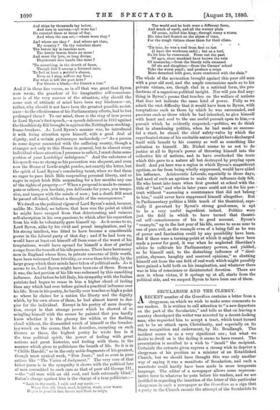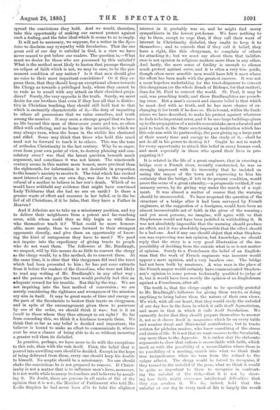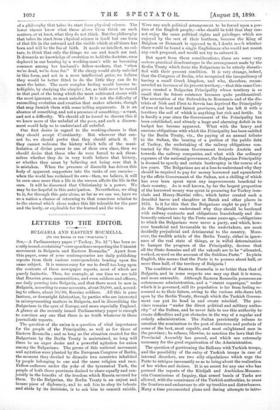SECULARISM AND THE CLERGY.
ARECENT number of the Guardian contains a letter from a clergyman, on which we wish to make some comments to our readers. It is written to call attention to "a new departure on the part of the Secularists," and tells us that on leaving a country churchyard the writer was accosted by a decent-looking man, who requested him to accept a tract, which tract turned out to be an attack upon. Christianity, and especially on its State recognition and endowment, by Mr. Bradlaugh. The incident seems to us a very significant one ; but what we desire to dwell on is the feeling it seems to have roused. The presentation is ascribed to a wish to " insult " the recipient. Certainly the extracts given express a strong wish to deprive a clergyman of his position as a minister of an Established Church, but we should have thought this was only another way of saying it was a manifesto of Secularism, and such a manifesto could hardly have been made in more temperate language. The editor of a newspaper allows some represen- tative force to whatever he puts before his readers, and we are justified in regarding the insertion of the letter of this particular clergyman in such a newspaper as the Guardian as a sign that a party in the Church resents the attempt of the Secularists to
spread the convictions they hold. And we would, therefore, take this opportunity of making our earnest protest against such a feeling, and the false ideal which it seems to us to imply.
It will not be necessary, we suppose, for a writer in the Spec- tator to disclaim any sympathy with Secularism. That the one great evil of our day is unbelief in God, is a view we have never ceased to put before our readers. The question is,—What must we desire for those who are possessed by this unbelief? What is the method most likely to hasten that passage through an eclipse of faith which is not, we may be sure, to be the per- manent condition of any nation ? Is it that men should give no voice to their most important convictions ? Or if they ex- press them, that they should keep an exceptional silence towards the Clergy as towards a privileged body, whom they cannot be so rude as to assail with any attack on their cherished preju- dices? Surely, the very opposite is the truth. Surely, we must desire for our brothers that even if they lose all that is distinc- tive in Christian teaching, they should still hold fast to that which is eminently characteristic of it,—the duty of imparting to others all possessions that we value ourselves, and truth among the number. It may seem a strange gospel that we have no life beyond this span of three-score years and ten, so often filled with suffering, and no home in the invisible, to which we may always turn, when the home in the visible lies shattered -and rifled. Some may think that those who hold this creed need not be forward to teach it to others. This was the tone of orthodox Christianity in the last century. Why be so eager, even from your own point of view, to destroy pleasing and con- solatory error ? was theit the latent question beneath much argument, and sometimes it was not latent. The nineteenth century seems in this matter more honest, more practical than the eighteenth, for information is not desirable in proportion to the hearer's anxiety to receive it. The trial which has excited most interest of any in our own day, was due to the resolute refusal of a mother to believe in her son's death. Which of us would have withheld any evidence that might have convinced Lady Tichborne that she had no son on earth ? Is there a greater waste of effort and resource in her belief, or in the be- lief of all Christians, if it be false, that they have a Father in HeaVen?
And if Atheists are to take up a missionary position, and try to deliver their neighbours from a potent and far-reaching error, with whom could they so fitly begin as with those who themselves teach it ? What could be more honour- able, more manly, than to come forward to their strongest opponents directly, and give them an opportunity of know- ing the kind of antagonism they have to meet ? We peed not inquire into the expediency of giving tracts to people who do not want them. The followers of Mr. Bradlaugh, we suspect, will by this means do as little to convert the clergy as the clergy would, by a like method, do to convert them. At the same time, it is clear that this clergyman did read the tract which had been presented to him ; he has put some extracts from it before the readers of the Guardian, who were not likely to read any writing of Mr. Bradlaugh's in any other way ; and the person who gave the tract would probably feel this an adequate reward for his trouble. But this by the way. We are not inquiring into the best method of conversion ; we are merely considering the rightness and wrongness of the mission- ary aim in itself. It may be great waste of time and energy on the part of the Secularists to bestow their tracts on clergymen, and in spite of the encouragement given them to persevere by one of the order, we should think it was ; but is it an insult to those whom they thus attempt to set right ? So far from conceding this, we think it a kindness towards them. We think that so far as any belief is decided and important, the believer is bound to make an effort to communicate it, where- -ever he sees a chance of being able to do so without incurring a greater evil than its disbelief.
In practice, perhaps, we have more to do with the exceptions to this rule, than with the rule itself. First, the belief that is poured into unwilling ears should be decided. Except in the hope of being delivered from them, every one should keep his doubts to himself. No sceptic should be a missionary. No one should shake the convictions he is not prepared to remove. If Christ- ianity is not a matter that is to influence men's lives, moreover, it is not worth while to annoy its teachers and believers by assail- ing it. No doubt, there are persons in all ranks of life of the opinion that it is not ; the Member of Parliament who told Mr. Leslie Stephen he had never been able to take the slightest interest in it probably was so, and he might find many sympathisers in the lowest pot-house. We have nothing to say to them, except to urge that, if they call their want of interest in Christianity disbelief, they ought to keep it to themselves ; and to concede that if they call it belief, they have a right, like this clergyman, to complain of others for attacking it ; but we must say about them that indiffer- ence is not opinion in religious matters more than in any other. And lastly, the mere sense of futility is enough to silence much .protest against error, and it is often a very true guide, though often mere sensible men would have felt it most where the effort has been made with the greatest success. It was not a more hopeless undertaking for the tract-dispenser to convert this clergyman (or the whole Bench of Bishops, for that matter), than for St. Paul to convert the world. St. Paul, it may be said, was preaching truth, and these Bradlaughites are preach- ing error. But a man's earnest and sincere belief is that which he must deal with as truth, and he has more chance of ex- changing it for truth if he does so. He is bound, within the limit- ations we have described, to make his protest against whatever he feels to be important error, and if he sees large buildings given up to the propagation of a mischievous mistake, men educated and paid to teach it, the State sanctioning an institution which has this sole aim with its partnership, the poor giving up a large part of their scanty time and energy to the study of it,—shall he not do all in his power to destroy it ? Ought he not to watch for every opportunity to attack this belief in every human soul, and most especially in those who spend their lives in pro- pagating it ?
It is related in the life of a great engineer, that in crossing a bridge over a French river, recently constructed, he was so strongly impressed with its insecurity that he insisted on seeing the mayor of the town and expressing to him his certainty that the bridge, if left in its present condition, would prove the scene of a great calamity,—a prognostic verified, if our memory serves, by its giving way under the march of a regi- ment. It was almost a matter of course that the warning should be unsuccessful. To have reopened the question of the structure of a bridge after it had been surveyed by French engineers, at the suggestion of a foreigner, would have been an almost inconceivable act of faith in the giver of the warning ; and yet most persons, we imagine, will agree with us that Stephenson would not have been justified in withholding it. It was not absolutely impossible that the warning should produce an effect, and it was absolutely impossible that the effect should be a bad one. And if any one should object that what Stephen- son was expressing was not opinion, but knowledge, we should reply that the story is a very good illustration of the im- possibility of deciding from the outside what is or is not matter of opinion. Surely to a Frenchman the belief of an English- man that the work of French engineers was insecure would appear a mere opinion, and a very baseless one. The bridge had not been built by amateurs. A wise man in the place of the French mayor would certainly have communicated Stephen- son's opinion to some person technically qualified to judge of it, but it would have been merely the opinion of an Englishman against a Frenchman, after all.
The truth is, that the clergy ought to be specially grateful to Mr. Bradlaugh's followers for giving them tracts, or doing anything to bring before them the nature of their own views. We wish, with all our heart, that they would study the unbelief of our day less in the form in which it calls itself Agnosticism, and more in that in which it calls itself Secularism. We earnestly desire that they should prepare themselves to answer it, not as it shows itself in magazines which lie on every table and number ducal and Ministerial contributors ; but in tracts written for plebeian readers, who know something of the stress and strain of life. It is not that we want answers to the Secularist, any more than to the Agnostic. It is rather that the elaborate arguments to show that culture is reconcilable with faith, which mock us with the possibility of a reconciliation where there is no possibility of a meeting, vanish into what we think their true insignificance when we turn from the refined to the vulgar atheist. The clergy would be forced to recognise, if they turned to the unbelief of the poor, what we think it would. be quite as important to them to recognise in confront. ing the unbelief of the rich,—that it is not by show- ing how faith might overcome intellectual difficulties that they can awaken it. We do, indeed, hold that the unbelief of our day in every rank of life is largely the result • of a philosophy that takes its start from physical science. The lower 'classes know what those abave them think on such matters, or at least, what they do not think. But the philosophy that takes its start from physical science is itself but one form of that life in the outward and the visible which at all times has teen and will be the foe of faith. It needs no intellect, no cul- ture, to think that only the things we see and touch are real. It demands no knowledge of evolution to hold the doctrine, once deplored in our hearing by a working-man's wife as becoming common among her husband's fellow-workers, that "when we're dead, we're done for." If the clergy would study unbelief in this form, and not in a more intellectual guise, we believe 'they would be better fitted to do the little they can do to meet the latter. The more complex feeling would become in- telligible, by studying the simpler ; for, as faith must be rooted in that part of the being which the most cultivated shares with the most ignorant, so must unbelief. It is not the difficulty of reconciling evolution and creation that makes atheists, though that may furnish them with some telling arguments. It is an absence of something, and not a presence of something,—a want, and not a difficulty. We should all be forced to discern this if we knew more of the unbelief of the poor, and such a discern- ment would help us to understand all unbelief.
Our first desire in regard to the working-classes is that they should accept Christianity. But wherever that can- not be, we should prefer that they should attack it. If they cannot welcome the history which tells of the mani- festation of divine power in one of their own class, then we should desire that those who do were forced to ask them- selves whether they do in very truth believe that history, ur whether they mean by believing not being sure that it is mistaken. When the pressure of discredit has driven this body of apparent supporters into the ranks of our enemies— when the world has reclaimed its own—then, we believe, it will be seen once more that a life in the unseen affects the life in the seen. It will be discerned that Christianity is a power. We may be too hopeful in this anticipation. Nevertheless, we cling to it, for through this gate alone, as far as we can see, have we as a nation a chance of returning to that conscious relation to to the eternal which alone makes this life tolerable for the poor and the lowly, or explicable for the learned and the wise.
































 Previous page
Previous page